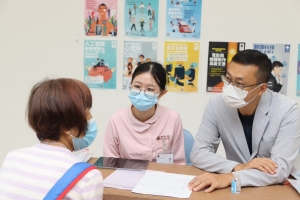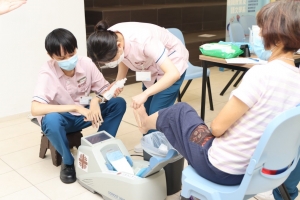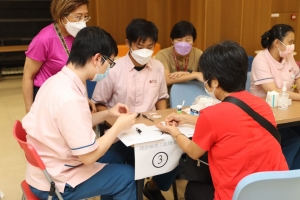



Communityhealth@CIHE, Caritas Institute of Higher Education's (CIHE) community health centre, in collaboration with the Society of Hospital Pharmacists of Hong Kong, organised a "Health Check and Consultation Day – post-COVID Symptoms" on CIHE's Tseung Kwan O Leng Campus on the 27th of August, aiming to raise public awareness on post-COVID symptoms ("Long COVID"). The event was well-recevied by the public with all seats sold out.
Healthcare professionals of Communityhealth@CIHE joined forces with students from CIHE's School and Department of Health Sciencesto provide participants with free health checks including Body Mass Index (BMI) and body fat percentage calculation, blood pressure and blood glucose measurement, bone mass measurement, macular degeneration test, diabetes risk assessment and dispensing consultation. Health counselling sessions provided by students offered tailored advice to participants according to their results. The Society of Hospital Pharmacists of Hong Kong also hosted a talk on prevention and treatment of post-COVID symptoms.
"Post-COVID symptoms have become one of the most popular health-related issues in recent months. There have been more and more products claiming to be able to prevent or treat post-COVID symptoms available on the market, such as chicken essence, probiotics and cordyceps. Overdose and drug interactions may occur if people lack understanding on the preparations they are taking," explained Anson Leung, pharmacist of Communityhealth@CIHE and a member of the organising committee. He hoped that the public may gain insights on properly preventing and treating Long COVID while avoiding drug-related problems.
YIP Yin-wa, representative of theThe Society of Hospital Pharmacists of Hong Kong, spoke about the prevention and treatment of Long COVID. Quoting the US's Centers for Disease Control and Prevention, she explained that the conditions occur in individuals with a history of probable or confirmed infection, with symptoms that last for at least 4 weeks and cannot be explained by an alternative diagnosis. Research also reflects that certain people tend to develop Long COVID: the elderly, obese individuals, people with a history of allergy, obstructive pulmonary disease patients, asthma patients and chronic patients. People who were infected by the Delta variant also have a higher risk to develop Long COVID than people who were infected by the Omicron variant.
Medical professionals, however, still possess limited knowledge on Long COVID since the symptoms may vary from patient to patient. It is believed that the influence may be traced back to the respiratory, cardiovascular, nervous, gastrointestinal, and musculoskeletal systems, the Pharmacist mentioned.
Common Long COVID symptoms include shortness of breath, fatigue, cough, cognitive dysfunction, headache, sleep problems, hair loss, emotional fluctuations, and changes in menstrual cycles. The mental health of the patient may also be affected. Pharmacotherapy designed to prevent and treat Long COVID is still in the clinal testing phase, hwile health management focuses on controling symptoms and minimising their impact on daily life.
It is suggested that patients with Long COVID symptoms should maintain a healthy lifestyle: take enough rest, resume exercise gradually, and have a balanced diet. Breathing exercises are also a good option if one is suffering from shortness of breath. The Pharmacist reminded that the effects of non-prescription vitamins and supplements on Long COVID symptoms are not understood and more research is needed to support claimed benefits.
Hygiene measures should also be taken to prevent Long COVID infection: wash hands frequently, wear a mask, avoid contact with infected patients and maintain social distancing. The most effective way is getting vaccinated. A study in Italy concludes that vaccinated individuals have lower risk to develop long COVID compared with non-vaccinated individuals, supporting the correlations between the rate of vaccination and the chance of developing Long COVID.